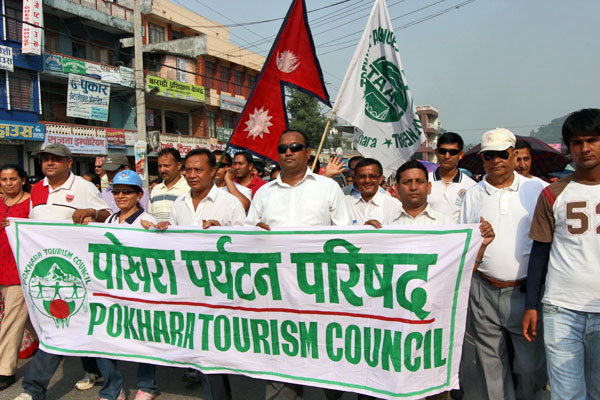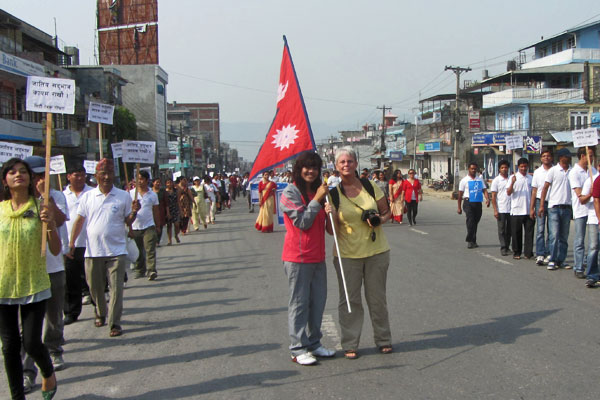Today is the day Nepal’s new constitution is finally supposed to be promulgated. It has been four long years in the making and over the past several weeks I have ping-ponged from despair that it would be impossible to meet the deadline once again this year, to riding a wave of optimism as I joined a peace march where citizens demanded that the long-awaited document finally be drafted and adopted.
Last Thursday morning, thousands of Nepali in Pokhara, Nepal marched in support of a United Nepal. Their cry, “Himal, Pahad, Terai,” (Mountain, Hills, Plains), was in response to violent demonstrations that have plagued the country over the past week, as some of Nepal’s more than 100 minorities demanded a new form of government that would divide the county into States based on ethnicity and identity. If their demands are successful, this tiny Asian country could be thrust into an era of tribal feuding that has not been seen since Prithivi Narayan Shah unified warring tribes into one central Himalayan kingdom in 1769.

Basu Tripathi, owner of Adam Tours in Pokhara and an organizer of the event, along with the local Chamber of Commerce, explained: “We all want prosperity for Nepalese Society. This is a great gathering of industrialists and tourism entrepreneurs and social people. Let’s not split mountains from the hills. Let’s not split hills from the Terai. Nepal is a unique combination; let’s keep this country prosperous, let’s keep this country integrated.”
Members of the Pokhara Tourism Council stepped off the rally in the Lakeside tourist area and proceeded to Zero Kilometer, where it merged with marchers representing area trade associations. The combined forces continued to the central market area, where leaders spoke in support of peace and cultural diversity.
The present strife is a direct result of the Maoist-led “Nepalese Peoples War” fought between 1996 and 2005. Maoists espouse the philosophy of the late Chinese Premiere Mao Zedong, architect of the brutal Cultural Revolution, who used violence and terror to overthrow the upper class, appropriate their estates, and redistribute land to the common people. In Nepal, the Royal Monarchy led by King Gyanendra had become corrupt and unresponsive to its subjects by the mid 1990’s. Maoists seized upon the unrest, promising free land, food, and the designation of States based on cultural identity to disenfranchised ethnic groups who had largely been ignored by the government. In 2006, Maoists agreed to a cease-fire and became a legitimate part of the government when Gyanendra was forced to step down in May, 2008.
The country has been struggling to forge consensus between opposing political parties ever since. Today’s deadline for adopting the constitution has been extended each year for the past three years, but last September the Nepal Supreme Court decreed further extensions illegal. As the deadline once again approaches, tensions flared. Members of lower castes say high-caste leaders have yet to acknowledge their grievances. Concerned they will not be equitably represented in the final constitution, various ethnic groups declared bandhs (general strikes) over the past two weeks that shut down all public transportation, closed stores, government offices, and factories, essentially crippling the country.
Can’t view the above slideshow of the United Nepal demonstration in Pokhara, Nepal? Click here.
Those in favor of a United Nepal that would not divide the country based on ethnicity and identity had been largely silent until Thursday, when the two associations took to the streets. Since then, there have been no further reports of violence in Pokhara, however the bandhs have left their mark. Despite the fact that tourists have not been targeted, Pokhara looks like a ghost town. Visitors who had to leave for Kathmandu were escorted to the airport by police buses but planes returning from the capital arrived empty, creating added hardship for local merchants who rely on tourist dollars.
Yesterday, a last minute resolution seemed possible when two of the three major political parties, the Nepali Congress (NC) and the Communist Party of Nepal (CPN-UML), presented a joint proposal that the interim constitution be immediately promulgated, with the two remaining disputed issues being forwarded to Parliament for resolution. The issues of contention are the formation of Provinces (States) – how many, what their names will be and what their boundaries will be – and whether or not they will be based on single or multiple ethnic identities. But by day’s end, unable to work out a compromise, all parties walked out of the meetings.

Many believe Maoists are unwilling to compromise on their demands at this time because their power will wane once the constitution is in place and new Parliamentary elections are held. Maoists won the largest share of seats in the interim Parliament through intimidation. Now that they have laid down arms and are a legitimate part of the government, most Nepali are no longer fearful of casting votes for the true candidates of their choice.
As I write this, last-ditch efforts are underway to reach consensus. Word on the street is that the final draft of the constitution is finished except drawing the map of the states. According to eKantipur.com, an online Nepal newspaper, “Parties are likely to forge consensus on the earlier agreed 11-state model with multiple-identity names to federate the country.” If so, this would be great news for Nepal. But if negotiations fall apart at the last minute, as has been the case every time over the past four years that resolution seemed possible, no one knows what might happen. By law, the Constituent Assembly (CA), which was created specifically for the purpose of writing the constitution, will cease to exist at midnight tonight. With no CA, no constitution to address the formation of a permanent government, and only an interim Parliament in place, it is anyone’s guess what will happen.

Great summary of the issues Barbara. As I mentioned to you in an earlier email – I had no idea this was going on so I appreciate the update. Be safe and please keep providing this info – as you know a piece of my heart is in Nepal – as well as many friends, so I’m hoping it can all be resolved.
Excellent insight into what is going on in Nepal so well explained. What an opportunity to watch history being formed in Nepal, that barely rates a mention in Australian newspapers.
Same in the U.S. TravelWonders. Hardly a mention. Sad.
Barbara Weibel
Writer/Photographer
Blog: holeinthedonut.com
Photo Library: easywebsite.net
Twitter: @holeinthedonut
LinkedIn: http://www.linkedin.com/in/barbaraweibel
Facebook: http://www.new.facebook.com/barbara.weibel
Skype: barbara.weibel
very informative and enlightening! Had no idea this was going on! thanks!!
My sister was in Nepal about this time last year and there were rumours of general strikes. It just blew my mind then that we in North American heard nothing about such things, or just had to search really extensively (or know someone in Nepal, as we did!). Thanks for sharing!
Hi Wandergirl: I am continually appalled by the coverage of world events we get in the US. Seems like the only thing they cover is places where there are wars, yet there is SO much international news that could be shared.
Thank you, thank you for keeping us abreast of the current political situation in Nepal. Your perspective is refreshing and gives me hope of a brighter future for the Nepalese people. I have been to Nepal x3, the last in 2008. Experienced the impromptu strikes by the Maoists and the checkpoints while on the way to Pokhara by bus. I, too, love Nepal and its people and plan to return next fall.
Well, it’s really interesting how it will finish …
Thanks for share !
I hope you can Kristina – the deadline for the Constituent Assembly (CA) to draft the new constitution ended at midnight last night, with no agreement between the political parties and thus no constitution. Today, bot the CA & the interim Parliament have been dissolved and we are essentially without a government, a situation ripe for chaos and revolution. I do daily updates on Facebook if you want to keep up more regularly. Thanks for your comment.
So proud of the work you’re doing to tell Nepal’s story! Continue to write and let us know what happens. I know we could find out by other news sources, but hearing a fellow travel blogger who’s vested in Nepal’s interests would have, I think, a greater perspective. I’m crossing my fingers for Nepal!
Hi Green Global: Thanks so much for your comment. My work does seem to be taking more of a journalistic bent with these events in Nepal, though I am decidedly not neutral. After I started publishing daily updates on my Facebook Page, my sister Googled about strikes in Nepal and found one article, by Fox News, talking about the situation in Nepal. Amazing to me that there is so much going on here but it is not being reported in the U.S. news. I’ve started to rely much more on other sources for my world news – Al Jazeera, out of Doha, Qatar. Keep those fingers crossed – mine are!
It’s so incredible that you’re there for history in the making! You’re documenting it incredibly well!!!
Thank you Andi! I feel so gratified to be here and see it in the making.
Oh boy, what serious excitement to be right in the middle of the re-birth of a nation and not know what will happen from day to day! I suppose as a world traveler, one could chose to place yourself into one situation after another, one war torn country after another and never see peace. I hope this fills your need for a long time. (Not that there was a need)
I applaud your daring to be in a country you love, reporting what is really going on. I hope they get it together this time. Nepal was one of the most interesting countries that I have had the pleasure to visit as a traveler (not a short-time tourist). I know personally, how friendly the people are and it pains me to see what is happening to them.
I see you’ve publicly taken sides. Not that you shouldn’t, but now there has been a line drawn.
Please lay low and stay safe.
Peace
Hi Steve: It is exciting, and frustrating. Nepal is my adopted spiritual home; I send 3- 4 months here each year. It’s where I come to rest and recover from my life of perpetual travel. So I am tied to the country emotionally and it pains me to see this ongoing struggle with the Maoists. My fingers are crossed that this sorts itself out soon; four years is to long with no permanent government.